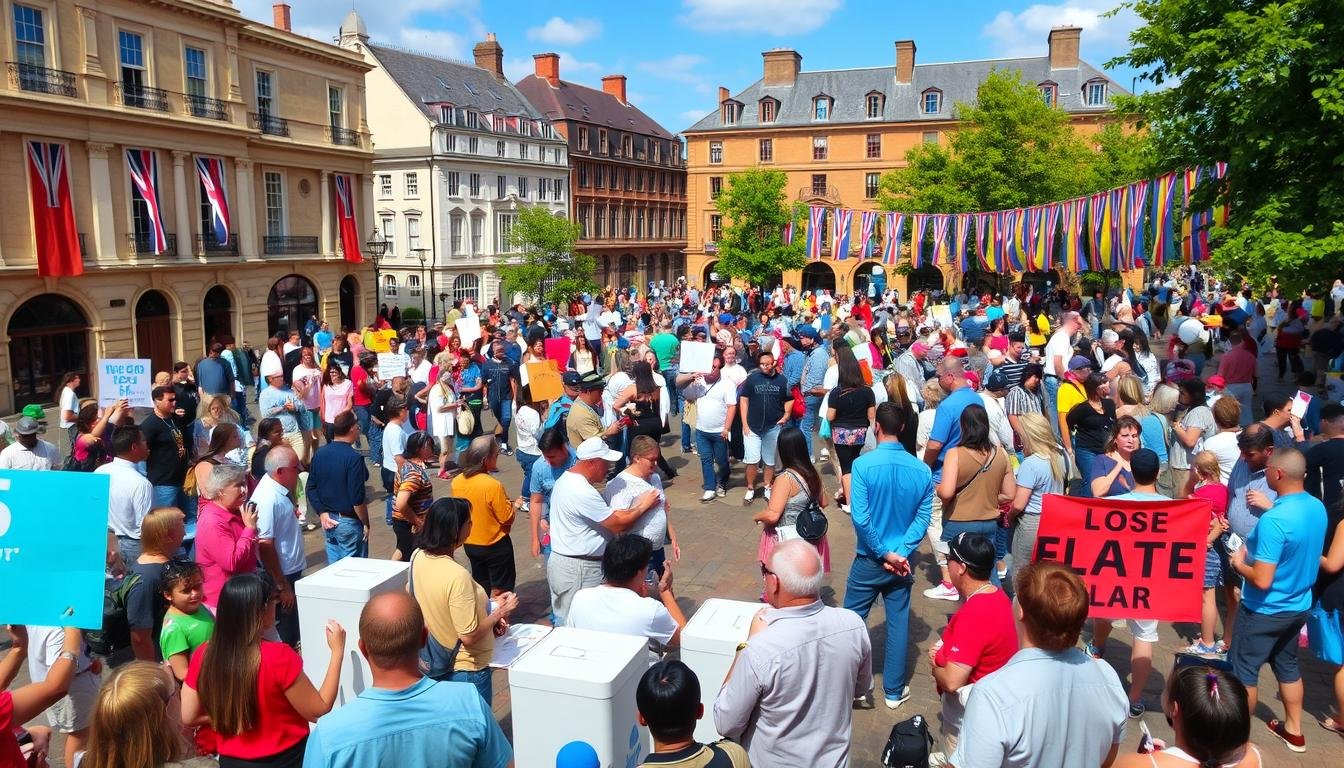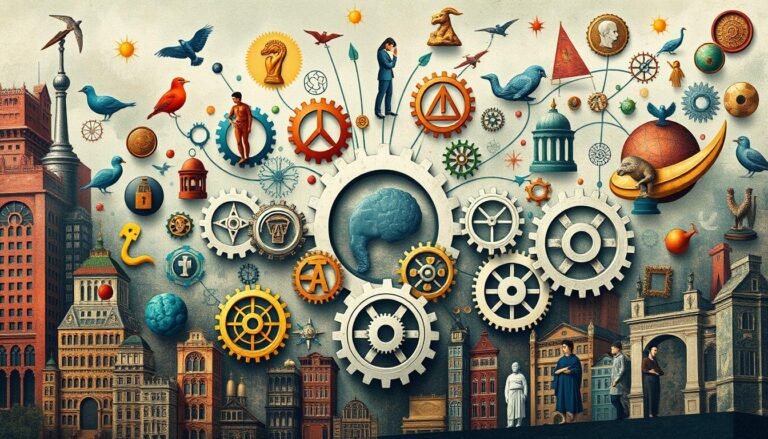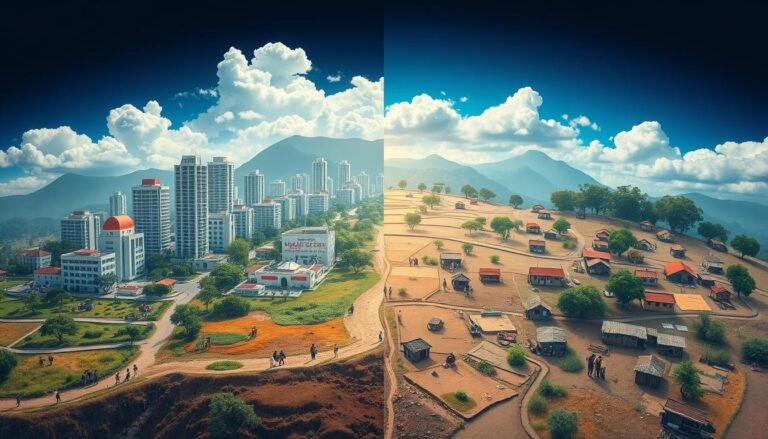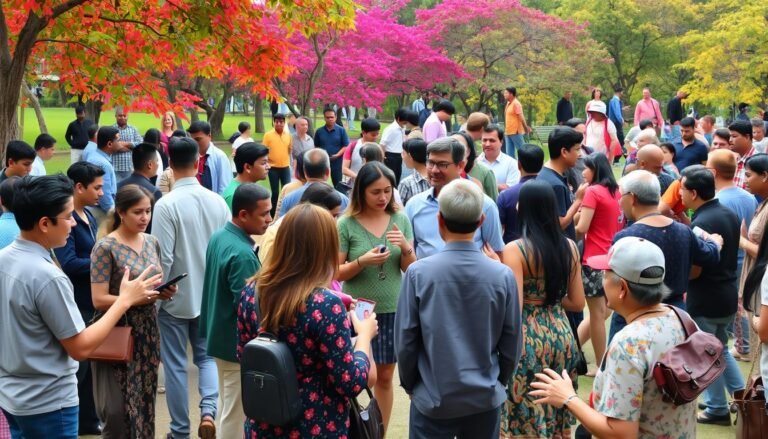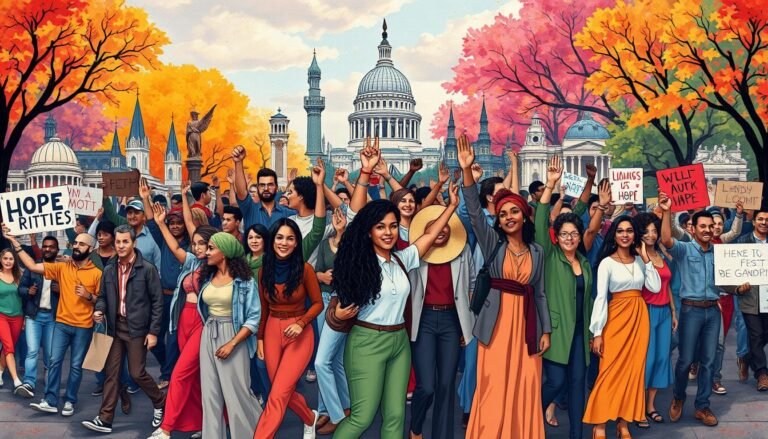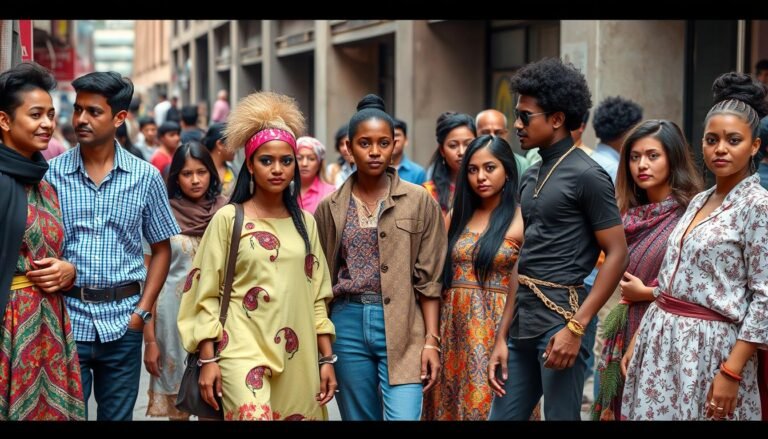The Role of Public Opinion in Democratic Societies
Can public opinion really change a nation’s path? In democratic countries, the people’s voice is very powerful. It affects policy and social norms. Tools like public sentiment analysis and opinion mining help us understand what people think. Political discourse analysis also helps us make sense of complex public opinions.
Democracy started in ancient Greece, where about 50,000 males out of 300,000 took part in politics. Now, we see how public involvement has changed. For example, New Zealand gave women the right to vote in 1893. Saudi Arabia did the same in 2011.
Public opinion goes beyond voting today. It means staying informed, sharing concerns, and joining groups to make a difference. The Universal Declaration of Human Rights says the people’s will should guide governments.
In our digital world, tools like public sentiment analysis and opinion mining have changed how we measure public feelings. They give leaders insights into what people think. Political discourse analysis also helps us understand public debates better, showing us what people care about.
Key Takeaways
- Public opinion is a cornerstone of democratic societies
- Sentiment analysis and opinion mining offer valuable insights
- Political discourse analysis helps interpret public thought
- Democracy has evolved from ancient Greece to modern global participation
- Public participation extends beyond voting to active civic engagement
- Digital tools have transformed how we understand and measure public opinion
Understanding Public Opinion in Democracy
Public opinion is key in democratic societies. It affects policy, shapes political talks, and helps citizens get involved. This interaction between the public and leaders is what makes democracy work.
Defining Public Opinion
Public opinion is what citizens think about political, social, and economic issues. It’s more than just voting; it shows what people value and worry about. In democracies, it’s a vital way for policymakers to get feedback.
Historical Context
Public opinion has changed a lot over time. From ancient ideas of the “voice of the people” to today’s polls, its role has expanded. Harold Lasswell said, “The open interplay of opinion and policy is the mark of popular rule.”
Importance in Democratic Governance
Public opinion helps shape policy and keeps leaders in check. It lets citizens share their views with leaders, affecting what gets discussed. Research shows 60% of politicians look at public feelings before big decisions.
| Aspect | Impact | Percentage |
|---|---|---|
| Trust in Government | Citizens believe their opinions should be heard | 85% |
| Leadership Accountability | Public dissatisfaction with politicians ignoring views | 70% |
| Policy Decisions | Politicians considering public sentiment | 60% |
Public opinion makes democratic processes legit and shapes social norms. It’s a strong force in giving feedback on policies, making sure government listens to its people.
Agencies and Channels of Public Opinion Expression
Public opinion is key in democratic societies. The press shares info on national interests and public issues. Political parties spread their views through events and speeches.
Family and school are where opinions start. They shape habits and tastes that show up in society. Other groups like public meetings, literature, radio, and TV also shape opinions.
Social media monitoring is now key to understanding public feelings. Sites like Twitter and Facebook are modern places for sharing and debating ideas. Opinion polls, both old and online, give us quick looks at what people think on different topics.
Interest groups use ads and PR to change opinions. Leaders and influencers help shape what people care about. Events like natural disasters or tragedies can quickly change public views.
Thanks to these many channels, public opinion keeps changing and affecting policy-making.
The Impact of Public Opinion on Policy-Making
Public opinion is key in shaping policy in democracies. It connects citizens with their leaders, affecting how the government and laws work.
Informing Policy Decisions
Policy makers use public opinion to understand what people need and want. A study looked at 754 surveys from 1992 to 1998. It showed that what people think really matters in making policies. This way of making decisions is more open and includes everyone.
Acting as a Check on Leadership
Public opinion keeps leaders in check. Research by Bartels (2002) showed that U.S. senators listen more to the wealthy. This means elected officials need to pay attention to everyone’s needs.
Presenting Public Views to Government Leaders
Surveys and polls share what people think. Pew Research found over half of Americans want the government to take a big role in solving problems. This tells leaders what people expect and what they care about.
| Government Function | Public Support (%) |
|---|---|
| Protection from Foreign Threats | 87 |
| Environmental Protection | 62 |
| Ensuring Healthcare | 69 |
Public opinion has a big impact on policy, but there are challenges. Finding a balance between what people want and expert advice is hard. This debate affects how democracies work.
Challenges in Measuring and Interpreting Public Opinion
Understanding what people think is hard. Trying to figure out what the public feels is tricky. Polls often get fewer answers and some people don’t trust them, making it tough to get a clear view.
Public opinion changes a lot. Samuel Popkin says people’s views can shift and don’t always stay the same. This makes it hard for researchers to get clear answers.
Designing surveys can be tricky. Questions might push people towards certain answers or miss the point of complex topics. Some polls are biased, aiming to sway public opinion. A recent example is Freshwater Strategy, whose high-profile polling efforts failed to predict key election outcomes. Quick polls might be easy but don’t give deep insights.
- Only about half of eligible U.S. voters participate in presidential elections
- Elections tend to reflect viewpoints of more educated and wealthier citizens
- Interest groups are often organized by wealthy and educated members
This means public opinion might not always reflect everyone’s views. In Illinois, some lawmakers thought what lobbyists said was what the public thought, showing a gap between real and perceived opinions.
Still, polls are key for understanding what people think. Most people see polls as a way to grasp public opinion, even if they’re not always sure about them. As methods to analyze opinions change, it’s important to aim for deep insights into what people really feel.
The Role of Public Opinion in Democratic Societies
Public opinion is the heart of democratic societies. It shapes policies and affects governance. It’s key to making sure the people’s will is heard in decisions.
Legitimizing Democratic Processes
In the UK, public views on crime led to big changes in the police. Even though crime went down from 2000 to 2003, people didn’t feel safer. This made the police ask for new ways to address people’s fears.
Influencing Political Discourse
Public opinion guides policy in the US, leading to things like term limits and tax cuts. The UK also uses public views to make policies, through surveys and focus groups.
Shaping Social Norms and Values
In the US, people’s anger about police actions in the 1960s led to big changes. This shows how people can push for changes in society and institutions.
| Country | Impact of Public Opinion | Result |
|---|---|---|
| UK | Perception of high crime rates | Police service reforms |
| US | Demand for stricter gun control | Brady Bill, assault weapon ban |
| UK | Concern over media independence | Ongoing debates on media regulation |
Finding the right balance between public opinion and expert advice is hard. The media greatly influences what people think, raising worries about too much control and false info. This shows how complex the relationship is between public opinion, politics, and democracy.
Public Opinion and Electoral Processes
Public opinion greatly affects how elections work. It changes how people vote and shapes campaign plans. A 2021 survey found that in 17 advanced economies, 56% of people thought their political system needed big changes or a complete overhaul.
Looking at voter behavior, we see some interesting facts. In the UK, 61% of those worried about the next generation’s money thought big political changes were needed. This was true for 34% of those who were hopeful about the future. This shows how people’s views on the economy affect their political views.
Election polls are often talked about a lot. They give us important political info. But, they have their limits. They’re great at telling us what people think or how much they think it, but not why they think it.
Focus groups help fill this gap. They give us deep insights into why voters make certain choices.
“Most politicians use public opinion research not to establish policies but to identify slogans and symbols that make predetermined policies more appealing to constituents.” – Jacobs and Shapiro
Public opinion has more power at the local level. This is because local issues are simpler and there’s less distance between voters and politicians. This shows how important it is to get people involved in local politics.
It’s key to understand how polls and elections are connected. Polls give us useful info, but they can’t tell us everything. They’re best at showing what people think, not why they think it. Voting patterns in the past are a good guide to future votes, especially for those who always vote for the same party.
The Influence of Media on Public Opinion Formation
Media is key in shaping public opinion in democracies. Traditional and social media spread information and shape opinions. This section looks at how different media affect public views and the issues they bring up.
Traditional Media’s Enduring Influence
Newspapers and TV news still greatly influence public opinion. They have a strong audience, especially with older people. These sources often lead discussions and offer deep analysis of complex topics.
Social Media’s Growing Impact
Social media has changed how we form opinions. Sites like Facebook and Twitter give us easy access to news and ideas. They can reach people in unique ways, making 57% of people in 19 advanced economies think social media helps democracy.
The Challenge of Misinformation
Social media has made it easier to share information, but it also spreads false news. 84% of people think it makes us more likely to believe lies. This has led to more political division and less civil talks.
| Impact | Percentage |
|---|---|
| Believe social media increases political division | 65% |
| View false information online as a major threat | 70% |
| Think social media makes people more informed | 75% |
The mix of traditional and new media in shaping opinions is vital to study. Social media brings new ways to engage, but it also brings challenges. Democratic societies must tackle these to keep public discussions informed and productive.
Evolving Trends in Public Opinion Research
Public opinion research is changing a lot. New tech and shifts in society are making us rethink how we measure what people think and feel. Now, we’re using new ways to dig deeper into opinions and emotions.
Old-school surveys are getting a boost from new methods. Online polls let us gather opinions fast from more people. Social media analysis shows us what people are talking about right now. Big data analytics looks at huge amounts of info to find patterns we missed before.
Deliberative polling is becoming more popular. It gives people balanced info before they share their views. This way, we get thoughtful opinions instead of quick answers.
| Research Method | Key Advantage | Challenges |
|---|---|---|
| Online Polling | Rapid data collection | Potential bias in sample |
| Social Media Analysis | Real-time insights | Limited to online population |
| Big Data Analytics | Comprehensive patterns | Privacy concerns |
| Deliberative Polling | Informed opinions | Time-intensive process |
These new trends are changing how we see public opinion. Now, we get a clearer picture of what people really think and feel. With technology getting better, we’ll see even more new ways to understand opinions and feelings in the future.
Conclusion: The Future of Public Opinion in Democracy
The future of public opinion in democracy is promising, with new ways for citizens to get involved. Deliberative democracy is becoming more popular. It focuses on making informed decisions through thoughtful discussions on important issues.
Technology is bringing new methods to measure and understand public feelings. But, there are still hurdles. Misinformation and division can harm public conversations. Finding a balance between what the public thinks and expert advice is key in making policies.
Studies show that public opinion polls are crucial in shaping policies. They give us a clear view of what people think. Besides polls, town hall meetings and campaign events also matter. As democracies change, so will how we listen to and act on public opinions.
Looking to the future, working together between political thinkers and those who study public opinion could lead to big improvements. This partnership could make both fields better, helping us understand democracy better. By accepting these changes, we can aim for a more responsive and open democratic system.
Source Links
- Democracy – Manual for Human Rights Education with Young people – www.coe.int
- What Civil Society Can Do to Develop Democracy
- Handbook on Politics and Public Opinion
- 7.2 Democracy and Public Opinion
- What is the importance of public opinion in a democracy? Describe the various agencies through which public opinion is expressed.
- 5.3 Democracy and Public Opinion
- Public opinion | Definition, Characteristics, Examples, Polls, Types, Importance, & Facts
- PUBLIC OPINION : IT’S FORMATION AND AGENCIES » IILS Blog
- Public opinion – Mass Media, Social Media, Influence
- Microsoft Word – Gilens CSDP paper.doc
- U.S. Public Opinion and the Role of Government
- The impact of public opinion on voting and policymaking – Zeitschrift für Politikwissenschaft
- Polling & Public Opinion: The good, the bad, and the ugly
- Allusions to public opinion and its influence in a democratic society are common
- The role of the media in democracies: what is it, and why does it matter?
- Global Public Opinion in an Era of Democratic Anxiety
- Public opinion – Influence, Formation, Impact
- Social Media Seen as Mostly Good for Democracy Across Many Nations, But U.S. is a Major Outlier
- The New Media’s Role in Politics | OpenMind
- Social Media Effects: Hijacking Democracy and Civility in Civic Engagement
- No title found
- Exploring the direct and indirect effects of elite influence on public opinion
- Public Opinion, Domestic Structure, and Foreign Policy in Liberal Democracies | World Politics | Cambridge Core

